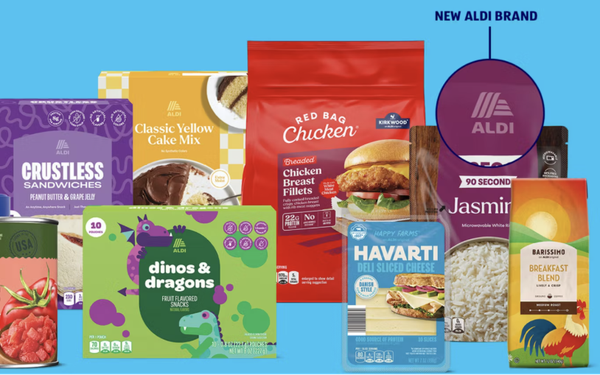
Aldi’s got an answer to
copycat lawsuits: It’s putting its name on everything in sight. The limited assortment supermarket chain is making sweeping changes to its private label products.
Aldi says
this is the company’s biggest refresh ever, aiming to make its private-label products even more recognizable to shoppers. And while the packaging approach is different -- some will simply say
“Aldi,” while others will say “an Aldi original” -- new labels make a more unified appearance on store shelves.
In June, snack giant Mondelez International sued Aldi in
a federal court in Illinois, claiming Aldi’s packaging and naming strategy “blatantly copies” its snacks, in ways meant to deliberately deceive hungry snackers. Aldi’s Thin
Wheat, for example was said to look remarkably like Mondelez’s Wheat Thins, and its Vanilla Wafers look quite a bit like Nilla Wafers. According to the filing, Mondelez is looking for
monetary damages and a court order preventing Aldi from selling products that allegedly infringe on its trademarks.
advertisement
advertisement
Aldi, which did not mention the lawsuit in its announcement, said the new
packaging has been in development for several years and was requested by customers.
“The new look and feel of our products is the next step in our journey to modernize our simpler,
quicker shopping experience,” says Atty McGrath, who began her role as CEO of Aldi U.S. several weeks ago, in the announcement. “Now, it’s easier than ever for shoppers to instantly
spot the value and quality only Aldi can deliver.”
While Aldi’s ongoing battle with Mondelez over snack lookalikes is getting headlines, the grocer has been sued for trademark
infringement almost every year since 2018, reports Supermarket News. It has faced cases from companies including Frito-Lay, Marks & Spencer, and Thatchers Cider, with mixed results, more
recently losing several in the U.K. and Australia. SN reports that a Mondelez win in the U.S. could pose a big legal setback to Aldi, setting a precedent that threatens the core of its
private-label strategy.
Mondelez did not respond to Marketing Daily’s request for an update by press time.
Delicious dupes are a major part of the fast-growing
grocer’s strategy. More than 90% of the products it sells are private label. Many are marketed under well-recognized names, including Clancy’s, Specially Selected and Simply Nature. Those
will keep their name but get packaging updates that label them “an Aldi original.”
“Our customers already call our private labels ‘Aldi brands,’ and we’re
excited to officially recognize them with a name they can see and trust," said Scott Patton, chief commercial officer, in the announcement. “Our research shows customers associate Aldi with
affordability, value, quality and convenience. Now, they can feel confident knowing our trusted name is behind every exclusive product in their cart.”
Aldi, already ranked as the
14th largest retailer in the U.S. by the National Retail Federation, is also the eighth-largest food retailer. And it’s getting bigger, faster: The Wall Street Journal
recently reported that its German parent is embarking on the company’s biggest U.S. expansion yet, adding 225 U.S. stores this year, bringing the total to 2,600. That would make it the
third-largest supermarket chain in the U.S., ranked by number of stores. Only Walmart and Kroger are larger.
To say its fans are devoted is something of an understatement. The retailer has its
own fan club, and loyalists can’t get enough, posting their favorites in “Aisle of Shame” social media updates. They also like the store's liberal return policy, and that it has been
making its Aldi-exclusive products free from certified synthetic colors for more than a decade.
Low prices are the main event, and the Batavia, Illinois-based company says its research shows a
family of four can save $4,000 per year by switching to Aldi’s.<